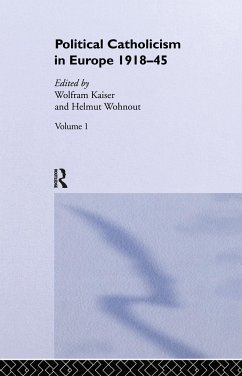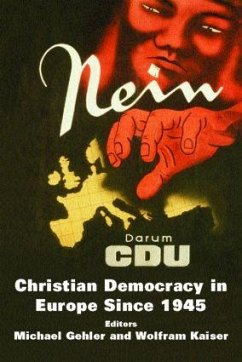
European Christian Democracy
Historical Legacies and Comparative Perspectives
Herausgeber: Kselman, Thomas; Buttigieg, Joseph A.

PAYBACK Punkte
66 °P sammeln!
In this engaging and innovative new book, French scholar Jacques Proust analyzes the image Europe presented to Japan, deliberately or otherwise, from the mid-sixteenth century to the end of the eighteenth century. Appearing for the first time in an American translation, Europe through the Prism of Japan relies on a large quantity of underexplored documents from which Proust has tried to reconstruct, like a puzzle, Japanese-European relations during the age of European exploration. This fascinating book describes in careful detail developments in Japanese culture and civilization during three h...
In this engaging and innovative new book, French scholar Jacques Proust analyzes the image Europe presented to Japan, deliberately or otherwise, from the mid-sixteenth century to the end of the eighteenth century. Appearing for the first time in an American translation, Europe through the Prism of Japan relies on a large quantity of underexplored documents from which Proust has tried to reconstruct, like a puzzle, Japanese-European relations during the age of European exploration. This fascinating book describes in careful detail developments in Japanese culture and civilization during three hundred years of interaction between Japanese and Europeans, including Dutch merchants, Spanish Catholic missionaries, and German and Portuguese Jesuits. Proust examines not only Europeans' influence on Japan but also the unique Japanese interpretation of European culture. This fresh perspective offers a prism through which Europe may be viewed and frequently sheds light on facets of European civilization of which not even the Europeans, at the time, were aware. Proust's lively study is especially valuable because of its interdisciplinary nature. Covering topics as wide ranging as art history, theology, philosophy, political and social history, and even the history of medicine, Proust interweaves these fields to present a unified historical and intellectual fabric. This round-trip journey between Japan and the West, which in the sixteenth century took about four years and can be done today in twenty-four hours, has the advantage of imposing on comparative studies a unique geographical and historical framework. Proust broadens our understanding of two very different cultures by providing new insight into both European and Japanese history.












